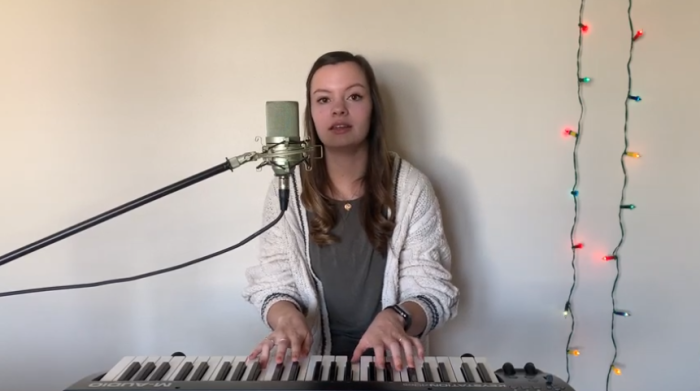Christian college accused of banning student for having premarital sex after she reported rape

Mara Louk, a former student of Visible Music College, alleges that the small conservative Christian school in Tennessee banned her from campus for having premarital sex after she reported being choked and raped by another student last November, a complaint filed with the U.S. Department of Education on Wednesday reveals.
“I just felt like, why did I even speak up?” the 22-year-old aspiring singer-songwriter told NBC News. “That’s truly how I felt for a long time because everything seemed to keep getting worse.”
Louk, who is represented by powerhouse attorney Cari S. Simon of The Fierberg National Law Group, claims in the complaint that she was raped by a male classmate at her off-campus apartment on Nov. 2, 2021.
She alleges that her rapist, who is unnamed in the complaint, had visited her apartment to play a board game. It was the first time they had ever spent time alone.
Louk wants the Education Department to investigate if Visible Music College violated the Clery Act, a federal campus safety law that requires colleges to advise students who report a sexual offense of their rights and assistance options. The complaint also asks the federal government to determine if the school discriminated against Louk under Title IX gender equity civil rights law.
Neither Louk’s attorney nor Visible Music College immediately responded Monday when contacted for comment on the complaint by the Christian Post.
Details highlighted by NBC News show that after the assault on Nov. 2, Louk said she reported what happened to a school administrator because she shared classes with the male student and didn’t want to be harassed.
On Nov. 4, Louk also reported the assault to the Memphis Police Department, according to records reviewed by NBC News.
A week later, she was informed by investigators that they did not have enough evidence to make an arrest on her allegations.
An official at Visible Music College also told Louk and her parents that because of the findings of the Memphis Police Department's investigation into the alleged rape, “there’s really nothing we can do at this point, so he will be attending classes like normal.”
Louk was encouraged to take up further concerns about the investigation with the local police.
According to the complaint, Louk was confronted by school officials about the nature of her relationship with her ex-boyfriend because the accused rapist had reportedly told school officials that Louk’s ex-boyfriend had confirmed that he had sex with her that semester. Even though she denied the claim, Visible Music College officials told her she would be disciplined for breaking school rules.
“It felt like a movie,” Louk told NBC News. “It didn’t seem real; it didn’t feel real. I kept thinking this is just a crazy, horrible nightmare, and hopefully, one day, I’ll wake up from it.”
As part of her discipline, Visible Music College reportedly asked Louk to sign a “pastoral care contract," confessing to breaking the school’s rules regarding premarital sex. She would then have to finish her degree online and be barred from the campus and speaking to other students about her rape allegations.
“We strongly believe that these restrictions will aid in bringing some needed structure, and will ensure that you are able to address the spiritual and emotional issues behind the infringements,” a copy of the contract reviewed by NBC News said.
Louk said she refused to sign the contract and withdrew from the college nine credits short of receiving her bachelor’s degree.
“They weren’t going to help me basically because it was off campus,” Louk argued. “But with a separate situation that was also off campus, they were going to handle that and punish me for it.”
Visible Music College declined to conduct further investigation into Louk’s allegations, citing Title IX regulations that don't give the school jurisdiction over an incident that took place off campus.
Earlier this month, the Department of Education announced intentions to review and potentially overhaul Title IX regulations that could alter Trump-era Title IX policies opposed by victims' rights advocates, civil rights groups, university administrators and trade groups representing K-12 schools.
In 2020, the Trump administration finalized Title IX regulations for on-campus sexual assaults that raised the bar of proof needed to take action against accused perpetrators following concerns that Title IX policies enacted during the Obama administration conflicted with the due process rights of accused students.
The Obama administration advised schools to use the "preponderance of the evidence" standard — meaning an accuser meets the burden of proof if the evidence is slightly more in favor than against — instead of the "clear and convincing" standard used by many colleges.
Hundreds of lawsuits have been filed against institutions since April 2011 by accused students claiming they were denied due process in campus judicial proceedings.
Trump's Education Secretary Betsy DeVos argued that the Trump-era regulations provided a fairer process for colleges to adjudicate sexual assault complaints. The Trump-era rules were supported by Republicans and the nonpartisan civil liberties group Foundation for Individual Rights in Education.
However, opponents contend that the Trump-era rules narrowed the definition of sexual harassment and incidents that schools could investigate.
Simon argues that the current regulation takes colleges off the hook for investigating off-campus sex crimes committed by students and “gives cover to schools that want to sweep sexual assault under the rug, as was done to Mara.”




























